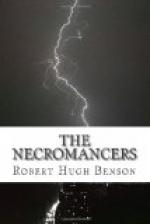The rest of the room he had furnished in a pleasing male kind of fashion, with a big couch drawn across the fire, a writing-table and chairs, a deep easy chair near the door, and a long, high bookcase covering the wall between the door and the windows. His college oar, too, hung here, and there were pleasant groups and pictures scattered on the other walls.
Maggie did not often come in here, except by invitation, but about seven o’clock on this evening, half an hour before she had to go and dress, she thought she would look in on him for a few minutes. She was still a little uncomfortable; she did not quite know why: it was too ridiculous, she told, herself, that a sensible boy like Laurie could be seriously affected by what she considered the wicked nonsense of Spiritualism.
Yet she went, telling herself that Laurie’s grief was an excuse for showing him a little marked friendliness. Besides, she would like to ask him whether he was really going back to town on Thursday.
She tapped twice before an answer came; and then it seemed a rather breathless voice which spoke.
The boy was sitting bolt upright on the edge of the sofa, with a couple of candles at his side, and the book in his hands. There was a strained and intensely interested look in his eyes.
“May I come in for a few minutes? It’s nearly dressing time,” she said.
“Oh—er—certainly.”
He got up, rather stiffly, still keeping his place in the book with one finger, while she sat down. Then he too sat again, and there was silence for a moment.
“Why, you’re not smoking,” she said.
“I forgot. I will now, if you don’t mind!”
She saw his fingers tremble a little as he put out his hand to a box of cigarettes at his side. But he put the book down, after looking at the page.
She could keep her question in no longer.
“What do you think of that,” she said, nodding at the book.
He filled his lungs with smoke and exhaled again slowly.
“I think it’s extraordinary,” he said shortly.
“In what way?”
Again he paused before answering. Then he answered deliberately.
“If human evidence is worth anything, those things happen,” he said.
“What things?”
“The dead return.”
Maggie looked at him, aware of his deliberate attempt at dramatic brevity. He was watching the end of his cigarette with elaborate attention, and his face had that white, rather determined look that she had seen on it once or twice before, in the presence of a domestic crisis.
“Do you really mean you believe that?” she said, with a touch of careful bitterness in her voice.
“I do,” he said, “or else—”
“Well?”
“Or else human evidence is worth nothing at all.”
Maggie understood him perfectly; but she realized that this was not an occasion to force issues. She still put the tone of faint irony into her voice.




